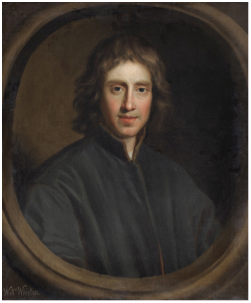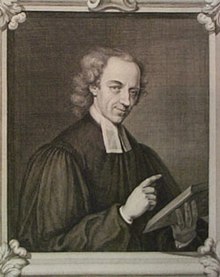William Whiston
From Wikipedia, the free encyclopedia
| William Whiston | |
|---|---|

William Whiston (1667–1752)
|
|
| Born | 9 December 1667 Norton-juxta-Twycross, Leicestershire, England |
| Died | 22 August 1752 (aged 84) Lyndon, Rutland, England |
| Residence | Kingdom of Great Britain |
| Nationality | English |
| Fields | Mathematician, theologian |
| Institutions | University of Cambridge |
| Alma mater | Clare College, University of Cambridge |
| Academic advisors | Isaac Newton Robert Herne |
| Notable students | James Jurin |
| Known for | Translating the works of Josephus, catastrophism, isoclinic maps, work on longitude |
| Influences | David Gregory Isaac Newton |
| Signature
|
|
Whiston succeeded his mentor Newton as Lucasian Professor of Mathematics at the University of Cambridge. Having lost the position over his theological views, he spent the rest of his life as a lecturer and writer
Early life and career
Whiston was born to Josiah Whiston and Katherine Rosse at Norton-juxta-Twycross, in Leicestershire, where his father was rector. He was educated privately, for his health, and so that he could act as amanuensis to his blind father.[1] He studied at Queen Elizabeth Grammar School, Tamworth. After his father's death, he entered Clare College, Cambridge as a sizar on 30 June 1686. He applied himself to mathematical study, was awarded the degree of Bachelor of Arts (BA) (1690), and AM (1693), and was elected Fellow in 1691 and probationary senior Fellow in 1693.[2]William Lloyd ordained Whiston at Lichfield in 1693. In 1694, claiming ill health, he resigned his tutorship at Clare to Richard Laughton, chaplain to John Moore, the bishop of Norwich, and swapped positions with him. He now divided his time between Norwich, Cambridge and London. In 1698 Moore gave him the living of Lowestoft where he became rector. In 1699 he resigned his Fellowship of Clare College and left to marry.
In 1701 Whiston resigned his living to become Isaac Newton's substitute, giving the Lucasian lectures at Cambridge.[1] He succeeded Newton as Lucasian professor in 1702. There followed a period of joint research with Roger Cotes, appointed with Whiston's patronage to the Plumian professorship in 1706. Students at the Cotes–Whiston experimental philosophy course included Stephen Hales, William Stukeley, and Joseph Wasse.[3]
Newtonian theologian
A portrait of William Whiston with a diagram demonstrating his theories of cometary catastrophism, described in A New Theory of the Earth
Whiston supported a qualified biblical literalism: the literal meaning should be the default, unless there was a good reason to think otherwise.[8] This view again went back to Augustine. Newton's attitude to the cosmogony of Thomas Burnet reflected on the language of the Genesis creation narrative; as did Whiston's alternative cosmogony. Moses as author of Genesis was not necessarily writing as a natural philosopher, nor as a law-giver, but for a particular audience.[9] The new cosmogonies of Burnet, Whiston and John Woodward were all criticised for their disregard of the biblical account, by John Arbuthnot, John Edwards and William Nicolson in particular.[10]
The title for Whiston's Boyle lectures was The Accomplishment of Scripture Prophecies. Rejecting typological interpretation of biblical prophecy, he argued that the meaning of a prophecy must be unique. His views were later challenged by Anthony Collins.[11] There was a more immediate attack by Nicholas Clagett in 1710.[12] One reason prophecy was topical was the Camisard movement that saw French exiles ("French prophets") in England. Whiston had started writing on the millenarianism that was integral to the Newtonian theology, and wanted to distance his views from theirs, and in particular from those of John Lacy.[13] Meeting the French prophets in 1713, Whiston developed the view that the charismatic gift of revelation could be demonic possession.[14]
Tensions with Newton
It is no longer assumed that Whiston's Memoirs are completely trustworthy on the matter of his personal relations with Newton. One view is that the relationship was never very close, Bentley being more involved in Whiston's appointment to the Lucasian chair; and that it deteriorated as soon as Whiston began to write on prophecy, publishing Essay on the Revelation of St John (1706).[13] This work proclaimed the millennium for the year 1716.[15]Whiston's 1707 edition of Newton's Arithmetica Universalis did nothing to improve matters. Newton himself was heavily if covertly involved in the 1722 edition, nominally due to John Machin, making many changes.[16]
In 1708–9 Whiston was engaging Thomas Tenison and John Sharp as archbishops in debates on the Trinity. There is evidence from Hopton Haynes that Newton reacted by pulling back from publication on the issue;[17] his antitrinitarian views, from the 1690s, were finally published in 1754 as An Historical Account of Two Notable Corruptions of Scripture.
Whiston was never a Fellow of the Royal Society. In conversation with Edmond Halley he blamed his reputation as a "heretick". Also, though, he claimed Newton had disliked having an independent-minded disciple; and was unnaturally cautious and suspicious by nature.[18]
Expelled Arian
Whiston's route to rejection of the Nicene Creed, the historical orthodox position against Arianism, began early in his tenure of the Lucasian chair as he followed hints from Samuel Clarke. He read also in Louis Ellies Dupin, and the Explication of Gospel Theism (1706) of Richard Brocklesby.[19] His study of the Apostolic Constitutions then convinced him that Arianism was the creed of the early church.[1]The general election of 1710 brought the Tories solid political power for a number of years, up to the Hanoverian succession of 1714. Their distrust of theological innovation had a direct impact on Whiston, as well as others of similar views. His heterodoxy was notorious.[20] In 1710 he was deprived of his professorship and expelled from the university.[1]
The matter was not allowed to rest there: Whiston tried to get a hearing before Convocation. He did have defenders even in the high church ranks, such as George Smalridge.[21] For political reasons, this development would have been divisive at the time. Queen Anne made a point of twice "losing" the papers in the case.[22] After her death in 1714 the intended hearing was allowed to drop.[23] The party passions of these years found an echo in Henry Sacheverell's attempt to exclude Whiston from his church of St Andrew's, Holborn, taking place in 1719.[23][24]
"Primitive Christianity"
Franz Wokenius wrote a 1728 Latin work on Whiston's view of primitive Christianity.[32] His challenge to the teachings of Athanasius meant that Whiston was commonly considered heretical on many points. On the other hand, he was a firm believer in supernatural aspects of Christianity. He defended prophecy and miracle. He supported anointing the sick and touching for the king's evil. His dislike of rationalism in religion also made him one of the numerous opponents of Hoadley's Plain Account of the Nature and End of the Sacrament. He was fervent in his views of ecclesiastical government and discipline, derived from the Apostolical Constitutions.[1]
About 1747 Whiston finally left the Anglican communion for the Baptists. He quitted the church literally as well as figuratively, as the clergyman began to read the Athanasian Creed.[1]
Lecturer and popular author
Whiston began lecturing on natural philosophy in London. He gave regular courses at coffee houses, particularly Button's, and also at the Censorium, a set of riverside meeting rooms in London run by Richard Steele.[33] At Button's, he gave courses of demonstration lectures on astronomical and physical phenomena, and Francis Hauksbee the younger worked with him on experimental demonstrations. His passing remarks on religious topics were sometimes objected to, for example by Henry Newman writing to Steele.[34][35]
Solar system chart by William Whiston and John Senex
By 1715 Whiston had also become adept at newspaper advertising.[38] He frequently lectured to the Royal Society.
Longitude
In 1714, he was instrumental in the passing of the Longitude Act, which established the Board of Longitude. In collaboration with Humphrey Ditton he published A New Method for Discovering the Longitude, both at Sea and Land,[39] which was widely referenced and discussed. For the next forty years he continued to propose a range of methods to solve the longitude reward, which earned him widespread ridicule, particularly from the group of writers known as the Scriblerians.[40] In one proposal for using magnetic dip to find longitude he produced one of the first isoclinic maps of southern England in 1719 and 1721. In 1734, he proposed using the eclipses of Jupiter's satellites.[41]Broader natural philosophy
Whiston's A New Theory of the Earth from its Original to the Consummation of All Things (1696) was an articulation of creationism and flood geology. It held that the global flood of Noah had been caused by a comet. The work obtained the praise of John Locke, who classed the author among those who, if not adding much to our knowledge, "At least bring some new things to our thoughts."[1] He was an early advocate, along with Edmond Halley, of the periodicity of comets; he also held that comets were responsible for past catastrophes in Earth's history. In 1736, he caused widespread anxiety among London's citizens when he predicted the world would end on 16 October that year because a comet would hit the earth. William Wake as Archbishop of Canterbury officially denied this prediction to calm the public.There was no consensus within the Newtonians as to how far mechanical causes could be held responsible for key events of sacred history: John Keill was at the opposite to extreme to Whiston in minimising such causes.[42] As a natural philosopher, Whiston's speculations respected no boundary with his theological views. He saw the creation of man as an intervention in the natural order. He picked up on Arthur Ashley Sykes's advice to Samuel Clarke to omit an eclipse and earthquake mentioned by Phlegon of Tralles from future editions of Clarke's Boyle lectures, these events being possibly synchronous with Christ's crucifixion. Whiston published The Testimony of Phlegon Vindicated in 1732
https://en.wikipedia.org/wiki/William_Whiston











0 komentar :
Posting Komentar